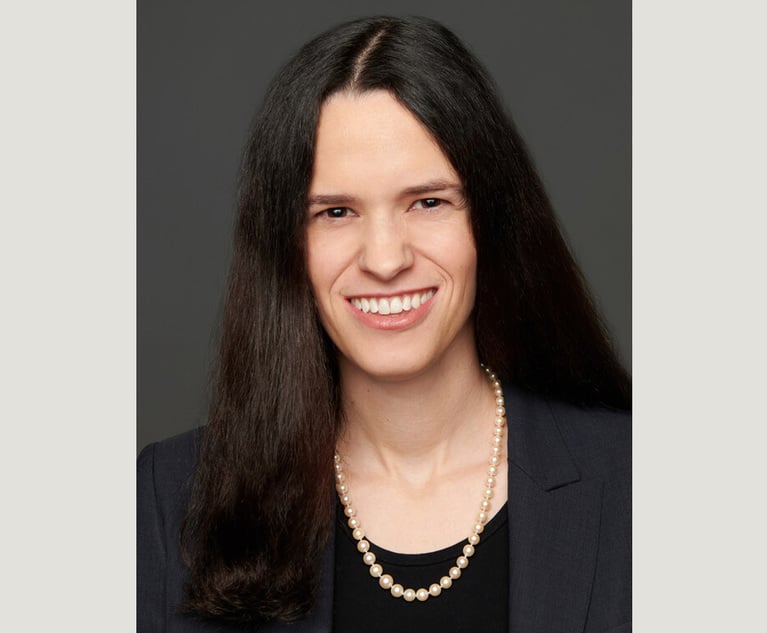Treasury GC Pick Brent McIntosh Discloses Big Law Income, Clients
Brent McIntosh, the Sullivan & Cromwell partner nominated to be general counsel to the U.S. Treasury Department, reported earning nearly $2.9 million in income from the firm last year, according to his financial disclosure on file at the U.S. Office of Government Ethics.
May 03, 2017 at 11:04 AM
22 minute read
Brent McIntosh, the Sullivan & Cromwell partner nominated to be general counsel to the U.S. Treasury Department, reported earning nearly $2.9 million in income from the firm last year, according to his financial disclosure on file at the U.S. Office of Government Ethics.
McIntosh, a partner in Washington and co-leader of the firm's cybersecurity practice, said he would withdraw from the partnership on his confirmation as general counsel. No hearing date is set.
As the Treasury's top lawyer, McIntosh would oversee more than 2,000 attorneys and be involved in setting policy and providing legal advice—a role that carries ever more prominence as the Trump administration prepares to advance a significantly reduced business tax rate.
“The president is determined to unleash economic growth for businesses. This is not just about large corporations. Small and medium-size businesses will be eligible for the business rate as well,” Treasury Secretary Steven Mnuchin said last week. President Donald Trump nominated McIntosh on March 14.
McIntosh's financial disclosure and accompanying ethics agreement provide a roadmap for potential recusal issues. For one year, McIntosh would be required to refrain from participating “personally and substantially in any particular matter involving specific parties in which I know the firm is a party or represents a party,” unless he receives a waiver.

Dick Duane
McIntosh's clients, according to his financial disclosure, have included Australia Pacific LNG, Barclays Capital Inc., Bank Hapoalim, BP PLC, Graham Spanier (former Penn State president), Higher One Holdings, JPMorgan Chase, Prudential Financial, U.S. Chamber of Commerce, the Securities Industry and Financial Markets Association, Volkswagen AG, Wells Fargo & Co. and Paulson & Co.
McIntosh also reported providing legal services to an unidentified “organizational client of Sullivan & Cromwell.” He said he could not identify the client because it “is subject to a non-public investigation.”
McIntosh's recusals will extend to matters handled by the firm Wachtell, Lipton, Rosen & Katz, where his wife, a former associate there, is a consulting attorney.
“For as long as my spouse continues to provide these services for Wachtell, Lipton, Rosen & Katz, I will not participate personally and substantially in any particular matter involving specific parties in which I know Wachtell, Lipton, Rosen & Katz is a party or represents a party, unless I am first authorized to participate,” McIntosh wrote in his ethics agreement.
McIntosh said he would divest certain assets—including holdings in Blackrock Inc., Citigroup Inc., T. Rowe Price Group Inc. and JPMorgan Chase & Co.—within 90 days of his confirmation. He also planned to divest interests in an investment fund—125 Broad Street Fund III LLC—that's available to Sullivan & Cromwell partners and administered by the firm.
McIntosh would join Sullivan & Cromwell colleagues Jay Clayton, confirmed Tuesday as chairman of the U.S. Securities and Exchange Commission, and Jeffrey Wall, the acting U.S. solicitor general, in the Trump administration. At Sullivan & Cromwell, Clayton, a partner since 2001, reported earning $7.6 million in the year leading up to his nomination.
U.S. senators grilled Clayton about his Wall Street ties at his confirmation hearing in March. He was confirmed 61-37.
Copyright National Law Journal. All rights reserved. This material may not be published, broadcast, rewritten, or redistributed.
This content has been archived. It is available through our partners, LexisNexis® and Bloomberg Law.
To view this content, please continue to their sites.
Not a Lexis Subscriber?
Subscribe Now
Not a Bloomberg Law Subscriber?
Subscribe Now
NOT FOR REPRINT
© 2025 ALM Global, LLC, All Rights Reserved. Request academic re-use from www.copyright.com. All other uses, submit a request to [email protected]. For more information visit Asset & Logo Licensing.
You Might Like
View All
Advertising Tech Likely to Draw More Scrutiny in 2025 Over Consumers' Data, Lawyers Say
5 minute read
In-House Moves of the Month: Boeing Loses Another Lawyer, HubSpot Legal Chief Out After 2 Years
5 minute read
Recent FTC Cases Against Auto Dealers Suggest Regulators Are Keeping Foot on Accelerator
6 minute read
‘Badge of Honor’: SEC Targets CyberKongz in Token Registration Dispute
3 minute readTrending Stories
- 1Deal Watch: Latham, Paul Weiss, Debevoise Land on Year-End Big Deals. Plus, Mixed Messages for 2025 M&A
- 2Bathroom Recording Leads to Lawyer's Disbarment: Disciplinary Roundup
- 3Conn. Supreme Court: Workers' Comp Insurance Cancellations Must Be Unambiguous
- 4To Avoid Conflict, NYAG Hands Probe Into Inmate's Beating Death to Syracuse-Area DA
- 5Scripture-Quoting Employee Sues Company for Supporting LGBTQ Pride
Who Got The Work
Michael G. Bongiorno, Andrew Scott Dulberg and Elizabeth E. Driscoll from Wilmer Cutler Pickering Hale and Dorr have stepped in to represent Symbotic Inc., an A.I.-enabled technology platform that focuses on increasing supply chain efficiency, and other defendants in a pending shareholder derivative lawsuit. The case, filed Oct. 2 in Massachusetts District Court by the Brown Law Firm on behalf of Stephen Austen, accuses certain officers and directors of misleading investors in regard to Symbotic's potential for margin growth by failing to disclose that the company was not equipped to timely deploy its systems or manage expenses through project delays. The case, assigned to U.S. District Judge Nathaniel M. Gorton, is 1:24-cv-12522, Austen v. Cohen et al.
Who Got The Work
Edmund Polubinski and Marie Killmond of Davis Polk & Wardwell have entered appearances for data platform software development company MongoDB and other defendants in a pending shareholder derivative lawsuit. The action, filed Oct. 7 in New York Southern District Court by the Brown Law Firm, accuses the company's directors and/or officers of falsely expressing confidence in the company’s restructuring of its sales incentive plan and downplaying the severity of decreases in its upfront commitments. The case is 1:24-cv-07594, Roy v. Ittycheria et al.
Who Got The Work
Amy O. Bruchs and Kurt F. Ellison of Michael Best & Friedrich have entered appearances for Epic Systems Corp. in a pending employment discrimination lawsuit. The suit was filed Sept. 7 in Wisconsin Western District Court by Levine Eisberner LLC and Siri & Glimstad on behalf of a project manager who claims that he was wrongfully terminated after applying for a religious exemption to the defendant's COVID-19 vaccine mandate. The case, assigned to U.S. Magistrate Judge Anita Marie Boor, is 3:24-cv-00630, Secker, Nathan v. Epic Systems Corporation.
Who Got The Work
David X. Sullivan, Thomas J. Finn and Gregory A. Hall from McCarter & English have entered appearances for Sunrun Installation Services in a pending civil rights lawsuit. The complaint was filed Sept. 4 in Connecticut District Court by attorney Robert M. Berke on behalf of former employee George Edward Steins, who was arrested and charged with employing an unregistered home improvement salesperson. The complaint alleges that had Sunrun informed the Connecticut Department of Consumer Protection that the plaintiff's employment had ended in 2017 and that he no longer held Sunrun's home improvement contractor license, he would not have been hit with charges, which were dismissed in May 2024. The case, assigned to U.S. District Judge Jeffrey A. Meyer, is 3:24-cv-01423, Steins v. Sunrun, Inc. et al.
Who Got The Work
Greenberg Traurig shareholder Joshua L. Raskin has entered an appearance for boohoo.com UK Ltd. in a pending patent infringement lawsuit. The suit, filed Sept. 3 in Texas Eastern District Court by Rozier Hardt McDonough on behalf of Alto Dynamics, asserts five patents related to an online shopping platform. The case, assigned to U.S. District Judge Rodney Gilstrap, is 2:24-cv-00719, Alto Dynamics, LLC v. boohoo.com UK Limited.
Featured Firms
Law Offices of Gary Martin Hays & Associates, P.C.
(470) 294-1674
Law Offices of Mark E. Salomone
(857) 444-6468
Smith & Hassler
(713) 739-1250










